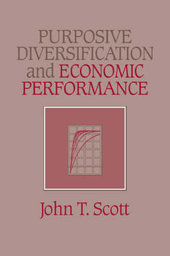
|
Purposive Diversification and Economic Performance
Paperback / softback
Main Details
| Title |
Purposive Diversification and Economic Performance
|
| Authors and Contributors |
By (author) John T. Scott
|
| Physical Properties |
| Format:Paperback / softback | | Pages:284 | | Dimensions(mm): Height 229,Width 154 |
|
| Category/Genre | Development economics |
|---|
| ISBN/Barcode |
9780521022583
|
| Classifications | Dewey:338.6 |
|---|
| Audience | | Professional & Vocational | |
|---|
| Illustrations |
32 Tables, unspecified; 21 Line drawings, unspecified
|
|
Publishing Details |
| Publisher |
Cambridge University Press
|
| Imprint |
Cambridge University Press
|
| Publication Date |
10 November 2005 |
| Publication Country |
United Kingdom
|
Description
This book examines product-line diversification in large manufacturing firms. It introduces and applies a methodology that discerns groups of manufacturing industries related by complementarities in production, marketing, distribution, and research and development (R&D) activities. Manufacturing firms intentionally vary production to exploit these complementarities, and Professor Scott uses evidence from US manufacturing to explore hypotheses about such purposive diversification and ensuing economic performance, including product diversification's effects on both static efficiency and the optimality of R&D investment. The study offers insights into the policy debate about cooperation versus competition among firms: will industrial performance be better if leading firms cooperate on research, production, and marketing? Professor Scott shows that the answers depend on circumstances that vary with different industrial environments. His analysis offers insights about business strategy and public policy toward business combinations in conglomerate, vertical, and horizontal mergers and in cooperative R&D ventures.
Reviews'John Scott has produced an encompassing work on the incentives for diversification and its ramifications ... The book is good. It is specific to the topic of purposive diversification. But within that topic, it is complete.' David I. Rosenbaum, Review of Industrial Organization
|